The Mera Peak Expedition spans 20 days, offering adventurers a unique opportunity to explore the stunning terrains of Nepal, beginning in Kathmandu. The journey includes acclimatization days, essential for adjusting to the high altitudes, while accommodations vary from cozy local lodges to nights spent camping beneath the stars. With experienced guides and a well-structured meal plan, participants are well-supported throughout their adventure. However, the success of the expedition hinges on several crucial factors, including proper permits and physical fitness. What are the specific challenges that climbers might face on this remarkable journey?
Good To Know
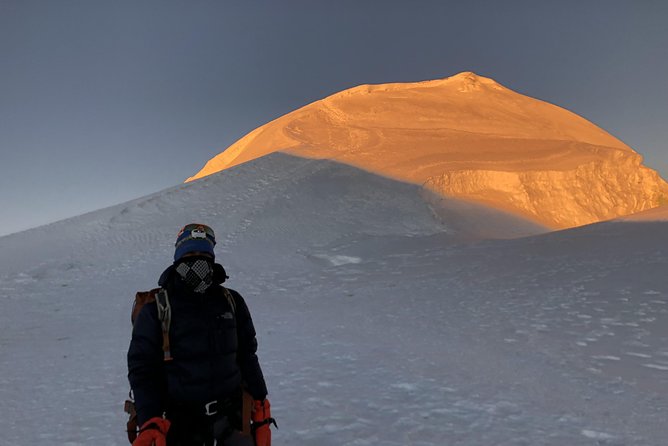
- The Mera Peak Expedition is a 20-day journey that includes acclimatization days for safe altitude adjustment.
- Participants enjoy a mix of accommodations, including lodges, a night at Base Camp, and camping experiences.
- Nutritious meals are provided throughout the trek to support energy needs, including breakfasts, packed lunches, and hearty dinners.
- Essential permits, such as the Mera Peak Climbing Permit and Sagarmatha National Park Fee, must be secured in advance.
- Personal travel insurance covering high-altitude trekking is mandatory for all participants during the expedition.
Expedition Details
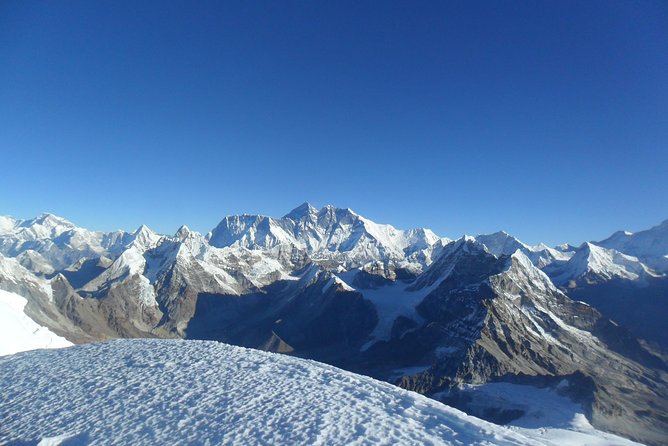
The Mera Peak Expedition offers adventurers a thrilling 20-day journey through the breathtaking landscapes of Nepal.
Starting in the vibrant city of Kathmandu, the trek leads participants through lush valleys, serene forests, and rugged mountain terrain. Each day, trekkers experience stunning views and encounter local cultures, enhancing their adventure.
The expedition includes a blend of trekking and acclimatization days, ensuring climbers adjust to the altitude. Travelers must possess strong physical fitness, as the trek challenges even seasoned adventurers.
Plus, the itinerary covers necessary permits and logistical arrangements, allowing trekkers to focus solely on the experience. With expert guides and support staff, participants can confidently tackle Mera Peak, a rewarding achievement in the heart of the Himalayas.
You can also read our reviews of more tours and experiences in Kathmandu.
Accommodation Options
For trekkers on the Mera Peak Expedition, comfortable accommodation plays a vital role in enhancing the overall experience.
In Kathmandu, participants enjoy four nights in twin-share lodgings with breakfast included, providing a cozy start to the adventure.
During the trek, trekkers spend 13 nights in local lodges, offering a glimpse into the culture and hospitality of the region.
The expedition also includes one night at Base Camp and another night at High Camp, where trekkers camp under the stars, surrounded by breathtaking landscapes.
These accommodations ensure trekkers can rest and recuperate after long days of exploration, creating a balance between adventure and comfort.
Thus, the thoughtfully arranged lodging options significantly contribute to the success of the Mera Peak Expedition.
Meal Plan
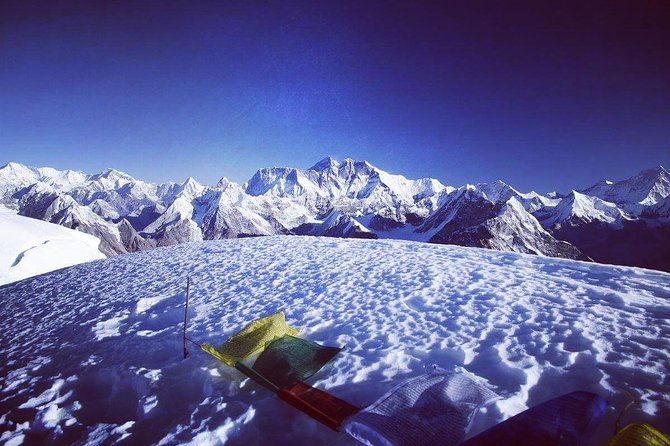
Meals play a crucial role in the Mera Peak Expedition, fueling trekkers for the challenges ahead. The meal plan is carefully crafted to provide balanced nutrition, ensuring everyone stays energized throughout the trek.
Breakfast in Kathmandu includes hearty options, while lunches and dinners are enjoyed in local lodges or tourist restaurants.
Trekkers can expect:
-
Nutritious Breakfasts: A mix of cereals, fruits, and local dishes, setting a strong start for the day.
-
Packed Lunches: Convenient and energy-rich, including sandwiches and energy bars for the trail.
-
Hearty Dinners: Local cuisine featuring rice, lentils, and vegetables, perfect for replenishing energy after a long day.
This thoughtful meal plan supports trekkers in achieving their goals on this remarkable journey.
Transportation Logistics
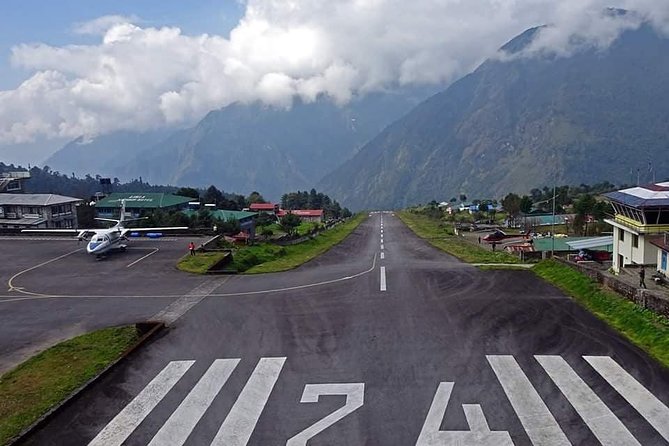
While embarking on the Mera Peak Expedition, participants can expect seamless transportation logistics that enhance their experience.
The journey begins with private vehicle transfers from the airport to the hotel, ensuring comfort upon arrival in Kathmandu. Participants will enjoy round-trip airfare from Kathmandu to Lukla, a vital gateway to the trek, with all airport taxes handled.
It’s important to note that excess baggage fees may apply for these flights, so packing wisely is essential.
Throughout the expedition, the efficient coordination of transportation keeps everything on schedule, allowing trekkers to focus on the breathtaking scenery and personal challenges.
Attention to these logistical details ensures a smooth journey, making the adventure even more rewarding.
Support and Equipment
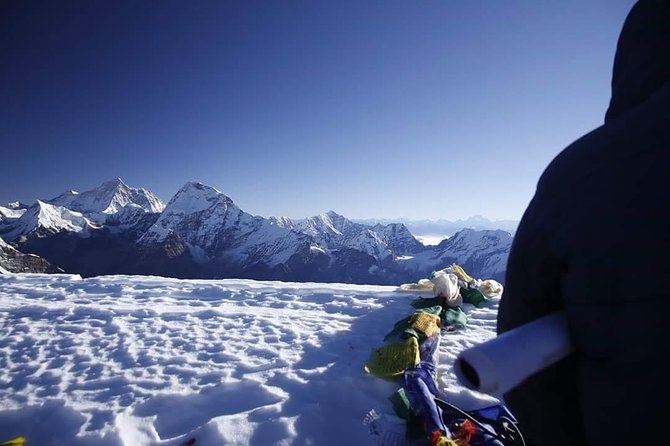
With transportation logistics efficiently arranged, participants can now focus on the robust support and equipment that will accompany them throughout the Mera Peak Expedition.
Their adventure is well-equipped thanks to a dedicated team and essential gear. The blend of professional guidance and quality supplies ensures a safe and enjoyable trek.
Key support and equipment include:
-
Experienced Sherpa Guides: Certified and English-speaking guides lead the way, enhancing safety and navigation.
-
Camping Gear: Participants benefit from durable tents, mattresses, and kitchen equipment to ensure comfort at Base Camp and High Camp.
-
First Aid Kits: Comprehensive medical kits are provided, addressing potential health concerns during the trek.
This thoughtful preparation empowers adventurers to enjoy the breathtaking experience ahead.
Required Permits
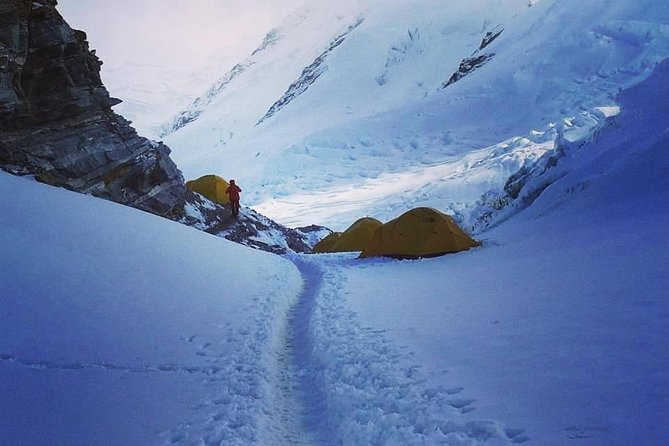
Before embarking on the Mera Peak Expedition, participants must secure several essential permits to ensure a smooth and legal climbing experience.
The primary permits include the Mera Peak Climbing Permit, which grants access to the summit, and the Sagarmatha National Park Fee, necessary for entering the protected area.
Plus, trekkers need to obtain TIMS (Trekkers’ Information Management System) permits, which help the Nepalese government monitor trekking activities for safety.
It’s crucial for climbers to prepare all required documentation in advance to avoid delays.
These permits not only facilitate a lawful expedition but also contribute to the conservation efforts within the national park.
Proper planning ensures participants can focus on the adventure ahead without administrative hurdles.
Insurance and Costs
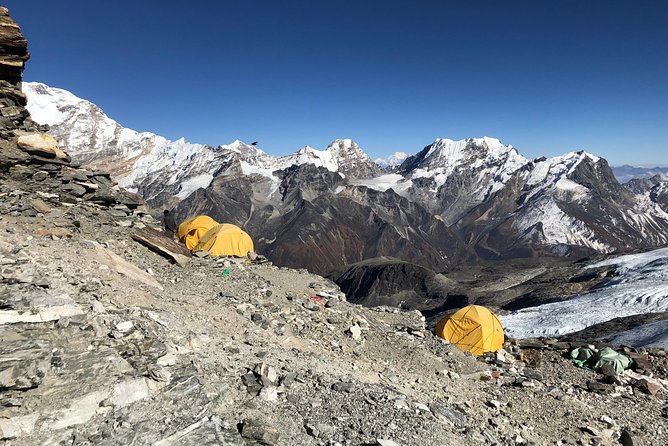
Securing the necessary permits is just one part of preparing for the Mera Peak Expedition; understanding insurance and associated costs is equally important.
Travelers must ensure they’ve personal travel insurance that covers high-altitude trekking and potential evacuation. Plus, budgeting for various costs will enhance the experience.
Key expenses to consider include:
- Permits: Mera Peak Climbing Permit, Sagarmatha National Park Fee, and TIMS permits.
- Visa Fee: Entry visa fee for Nepal, which varies based on duration.
- Tips and Beverages: Customary tips for guides and porters, plus costs for drinks not included in the package.
Being aware of these factors helps adventurers prepare financially for an unforgettable journey.
Important Travel Information
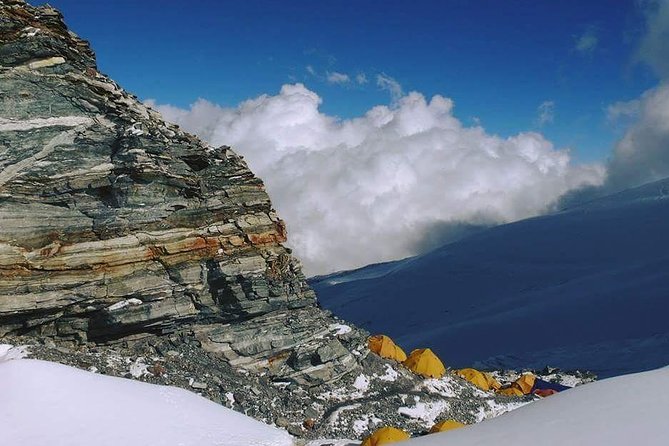
Preparation is vital for ensuring a smooth and enjoyable Mera Peak Expedition. Travelers should secure their permits, including the Mera Peak Climbing Permit and TIMS permits, well in advance. A valid Nepal entry visa is essential, so obtaining this before arrival is recommended.
Personal travel insurance covering high-altitude trekking is mandatory. It’s wise to budget for additional costs, like tips for guides and porters, as well as beverages not included in the package.
Participants must also consider their physical fitness level, as the trek requires strong stamina. Lastly, familiarizing oneself with local customs and preparing for variable weather conditions will enhance the overall experience, ensuring trekkers are well-equipped for this extraordinary adventure.
Frequently Asked Questions
What Is the Best Time to Undertake the Mera Peak Expedition?
The best time for high-altitude treks in Nepal, including Mera Peak, is typically from late September to early December and March to May. During these months, weather conditions are favorable and views are stunning.
Are There Any Age Restrictions for Participants?
There aren’t strict age restrictions for participants, but most trekking companies recommend ages between 16 and 60. Those outside this range should consult with their doctor and consider personal fitness and health conditions.
Can I Join Solo or Do I Need a Group?
He can join solo, as many expeditions welcome individual trekkers. However, it’s advisable to check with the organizing company to ensure there’s a suitable group for companionship and support during the journey.
How Difficult Is the Trek Compared to Other Peaks?
The trek’s difficulty varies, but it’s generally considered moderate to challenging. Participants should have strong physical fitness and prior trekking experience, making it more demanding than easier trails, yet accessible for determined adventurers.
What Should I Pack for the Expedition?
For the expedition, he should pack essential gear like sturdy trekking boots, warm layers, a waterproof jacket, gloves, a hat, sleeping bag, personal items, and snacks. Proper packing ensures comfort and safety throughout the adventure.
The Sum Up
The Mera Peak Expedition offers an extraordinary opportunity for adventure seekers to explore Nepal’s stunning landscapes. With well-planned logistics, comfortable accommodations, and a focus on safety, participants can fully enjoy this unforgettable journey. From the excitement of trekking through lush valleys to the thrill of reaching the summit, this expedition caters to both experienced climbers and enthusiastic novices. By preparing adequately and embracing the experience, adventurers will create lasting memories in the heart of the Himalayas.
More Tour Reviews in Kathmandu
Not for you? Here's more nearby things to do in Kathmandu we have reviewed
- From Lukla: Everest Base Camp (EBC) 10-Day Trek
- Kathmandu : Everest Mountain Flight – with Private Transfers
- Full Day : Kathmandu Sightseeing By Bus Day Trip
- Kathmandu: 7 UNESCO World Heritage Sites Day Tour
- Kathmandu: 8-Day Langtang Valley Trek with Transfers
- Thamel Rickshaw Tour
- Everest View Motorbike Tour- 6 Days
- Kathmandu: Top 4 UNESCO Sites Private/Group Tour with Lunch
- From Oceans to Mountains-9 Days (Nepal Guided Tour)
- From Kathmandu: Everest Base Camp Helicopter Tour landings
- Kathmandu: Food and Drink Walking Tour
- Life and spirituality tour of Kathmandu
